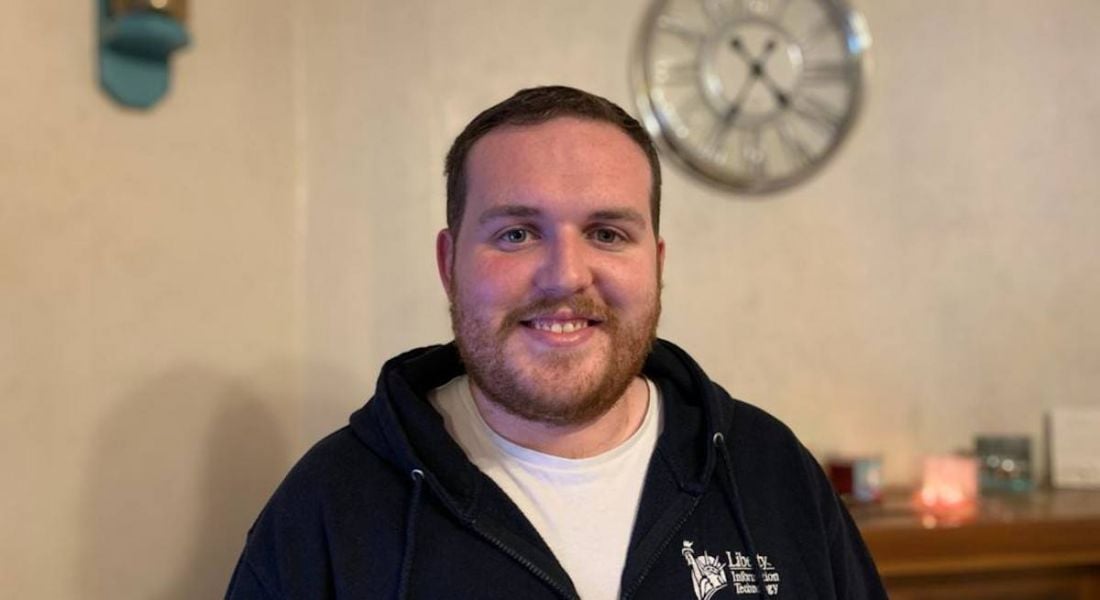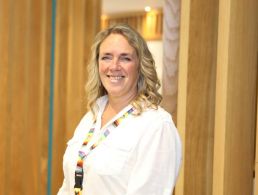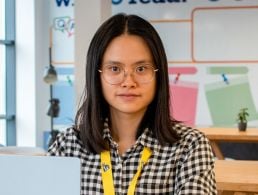Liberty IT’s Ian Quain talks about his experience on the company’s graduate programme and how his skills developed over time.
After completing a bachelor’s degree in software design at Athlone IT, Ian Quain joined Liberty IT as part of its graduate programme.
He told Siliconrepublic.com that his degree was a hybrid, incorporating some elements from a typical computer science curriculum and some elements from a more practical software engineering degree.
Now, he’s working in his desired industry as a software engineer on the edge of technology.
‘We are a team and all take shared responsibility for everything that we put out’
– IAN QUAIN
What drew you to Liberty IT when you were seeking work as a graduate?
Initially, I joined the company as an intern. However, what caught my eye at the time was that the recruitment process was so different from all the other processes I had been in. It looked at more than just my ability to remember algorithms and placed emphasis on bug finding, system design and interpersonal communication.
Then, after having worked here as an intern for eight months, I had developed a fondness for the company culture and I didn’t think twice about coming back upon graduation.
What expectations did you have before you began the programme?
To be honest, I was nervous. I had committed to commuting three hours a day to and from Liberty IT. I was nervous that I might not be a capable enough engineer and I was also worried that I could be stuck making the tea and coffee, especially after the horror stories that you read on the internet about interns’ experiences elsewhere.
I was so surprised, pleasantly, when I was viewed as an equal to everyone else on the team. Titles and experienced didn’t matter and it never felt like I had a boss telling me what to do. It was more like a group of friends just helping each other out and working towards a common goal.
What duties and responsibilities were you given initially?
When I first joined, I worked on an internal application. I was working closely with a senior software engineer and we were responsible for everything from the infrastructure to meeting with the stakeholders.
This served as a great learning environment and allowed me to really get involved in the entire software development life cycle, something that I hadn’t been involved in before that.
Did the scope of your work change as the programme progressed?
Yes, massively! I started on an application, focused primarily on front-end work. Very quickly I was moved to another team that was working on event streaming solutions. I also started to become more involved in the system design discussions and the security reviews.
Can you describe a typical day in your role?
A typical day in my role usually goes a little like this:
9am: Log in, check e-mails and Slack and get up to date on anything that may have happened overnight – Liberty IT has customers across the globe who are active while are asleep.
9.30am: Have a look at any open pull requests that I am a reviewer on and check on my own to see if there are any comments.
10.30am: Stand-up meeting. I am fond of making a few dry jokes at these.
11am: Tidy up my pull requests if there were comments to be addressed or get started on something new if everything was good.
12pm: Lunch time. Working from home has been great because I can meet up with friends and family during my lunch break now.
1pm: Catch up on any emails, documentation or admin-based work that I have to do.
2pm: Dig back into that code I was writing earlier.
4pm: Commit my code and do a quick self-review to make sure that I am following good practices.
5pm: Finish up for the day. Watch some funny cat videos or some TikToks.
I try to get up and move around for five minutes out of every hour. I don’t drink coffee but some days I will also take 20 minutes to go out to the river behind where I live and have a little walk.
How do your responsibilities compare to more experienced employees’?
Our responsibilities are relatively similar. We are a team and all take shared responsibility for everything that we put out. The only difference is that the more senior engineers have to attend more meetings about communication and direction.
Do you feel more prepared for working life after completing this programme?
Absolutely. I developed a lot as a professional. My technical skills developed much faster than they had previously in academia because I was writing code every day and it was being scrutinised to ensure that we were sticking to best practices.
My soft skills have also seen a lot of improvement. Working in a team with others and having to collaborate and communicate regularly go a long way to making you a better engineer overall.
Why should someone apply to the graduate programme at Liberty IT?
If you want to develop technically and have fun doing it then this is the place for you. You’ll get to work on cutting-edge technology and on very real business applications and you will also be seen as an invaluable member of your team.
You’ll also make some friends that will last a lifetime. It’s not just all work, there are plenty of events to help you get to know others and like in university, there are social events, like our games nights where you can hang out with other like-minded people.




